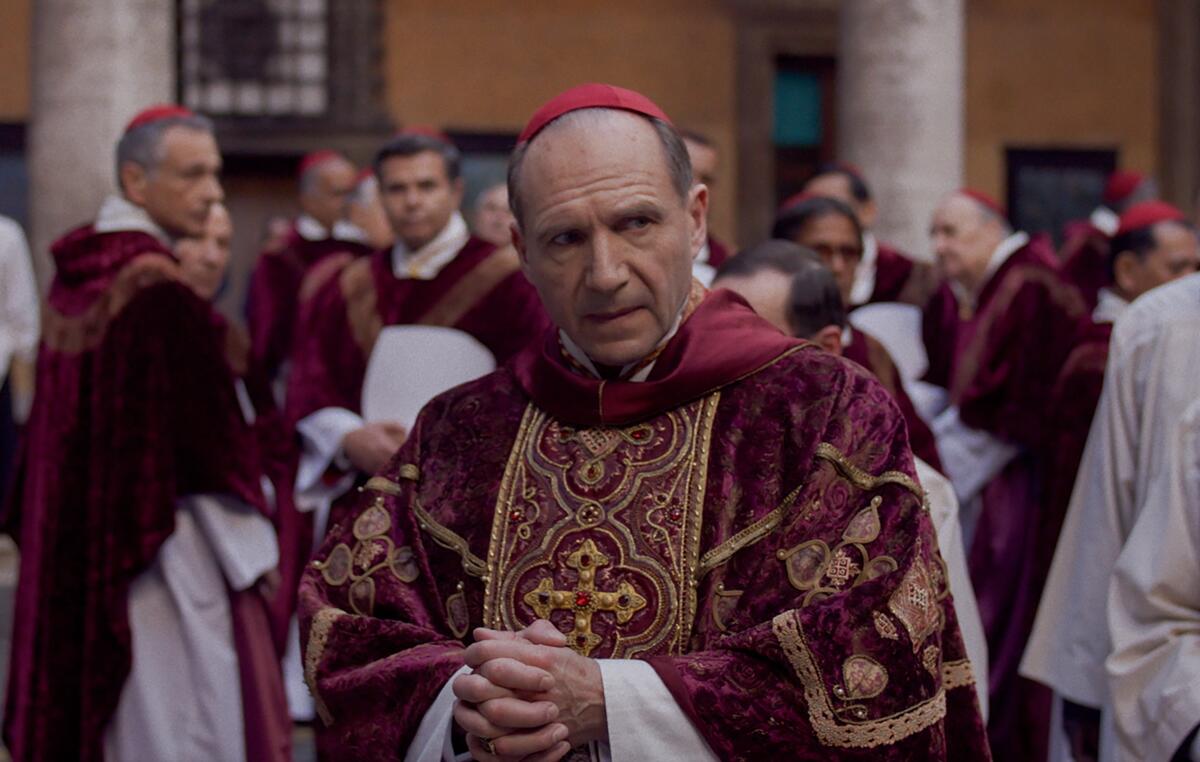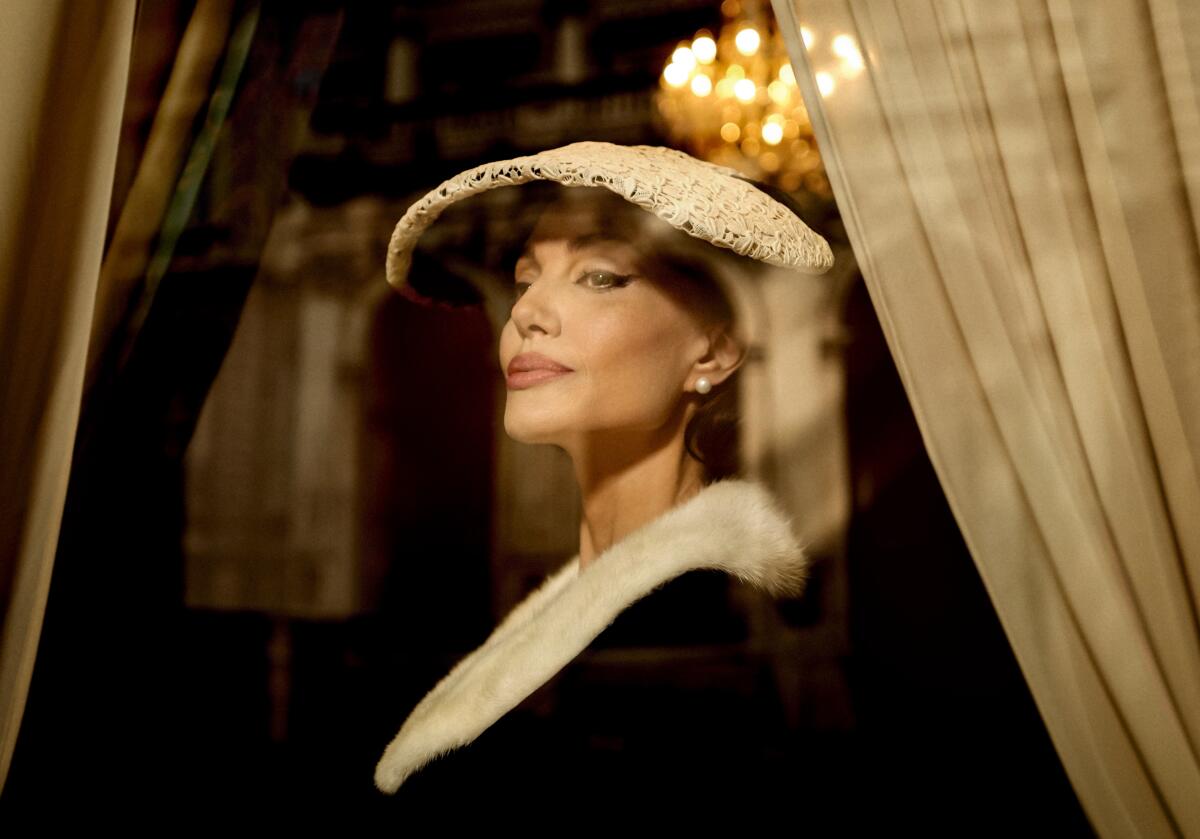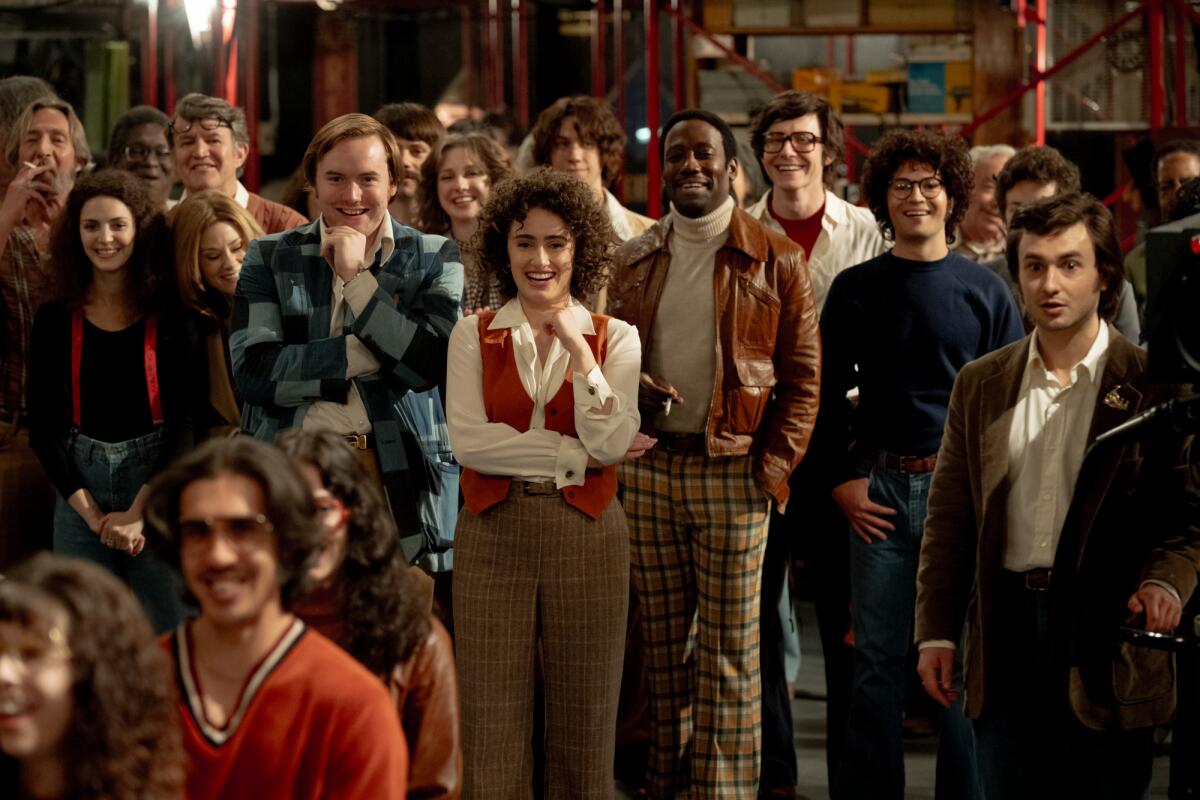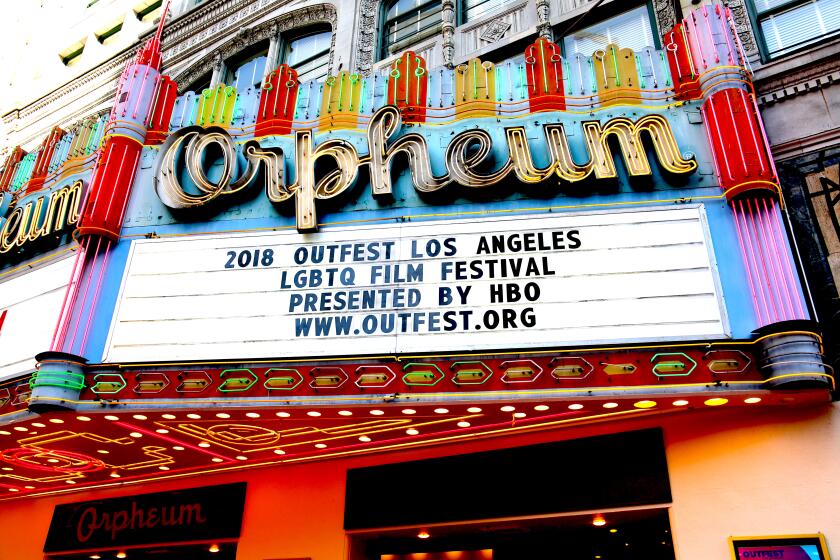At Telluride, ‘Conclave’ pleases, even if other Oscar hopefuls aren’t ready for prime time

TELLURIDE, Colo. — The camera tips skyward in several early moments of RaMell Ross’ exquisite, elliptical “Nickel Boys.” It’s counterintuitive when a filmmaker does this: Let’s assemble all these beautiful actors and sets, the whole of a movie’s production design, but instead, turn our attention to the clouds, an exploding beam of sunlight, the swaying trees, an orange ripe for picking. A director who is a searcher, spiritual or otherwise — and Ross is surely one — will sometimes simply look up, just as Terrence Malick did in “The Thin Red Line,” even while making a war picture.
Head tilted back is also how we often receive a movie (especially if you’re like me and prefer the front row), immersed in a state of happy submission, hoping for some kind of deliverance. This is why people come to a place like Telluride, surrounded by gorgeous mountains and refreshing breezes, mainly to watch a bunch of films. There are, of course, other reasons to be here: hints to be gleaned about the upcoming Oscar race. Publicists and prognosticators refresh their phones for news out of the Venice Film Festival, already in progress. By the time Toronto begins its annual showcase next week, awards season will be in full throng. But to spend a not-so-lazy Labor Day weekend in Telluride — as industry-centric as that can sometimes be — is to hang onto the dream of discovery.
And, at least so far, the festival has made good on that promise. “Nickel Boys,” a free adaptation (by Ross and co-screenwriter Joslyn Barnes) of Colson Whitehead’s 2019 novel about abuses at a Florida reformatory for boys in the 1960s, cast a hush over its world-premiere audience. The effect of the movie is cumulative and shattering, not as immediate as what the Pulitzer-winning book is celebrated for. Rather, Ross has made the radical decision to commit to a first-person approach, the camera “seeing” for the speaker. It takes some getting used to, but it puts you in an outward-facing mood, attuned to sounds and intimacies. (Not since Hollywood’s 1947 noir “Lady in the Lake” — or, in fairness, the GoPro hyper-action flick “Hardcore Henry” — has this strategy gotten so thorough a workout.)
After igniting a firestorm at Cannes, ‘The Apprentice’ will be a surprise addition to this week’s Telluride Film Festival and hit U.S. theaters in time for election day.
What we see are the first flashes of a young man’s curiosity. He helps decorate his home’s Christmas tree alongside a doting grandmother, Hattie (Aunjanue Ellis-Taylor), the tinsel falling from her hands like lightning bolts. Elsewhere, he pays attention in class, listening to the speeches of Martin Luther King Jr. as his schoolmates pound their desks. In one revelatory moment, we finally see whose eyes we’ve been looking through, captured in the reflection of Hattie’s seesawing iron: Elwood (first played by Ethan Cole Sharp, then by a haunted Ethan Herisse). Also, because this is Tallahassee during Jim Crow and Elwood is Black, we witness some images of racism, brazen in their out-in-the-open directness. A large cross is dragged by a truck down the road, its metal base throwing up hateful sparks.
On the cusp of a more promising future at a technical college, Elwood is unfairly implicated in a crime and sent to Nickel Academy, a place of barbarism and midnight beatings where he meets another scared boy, Turner (Brandon Wilson), and the point-of-view perspective suddenly shifts to him, bringing Elwood into the frame. Mostly, their education involves learning that they are “grubs,” only suitable for hard labor and sexual predation, with the faint potential of becoming “explorers,” then “pioneers” and finally “aces.”
Director Ross, who spent years as a photographer and teacher, came close to reinventing documentaries with his superb 2018 debut “Hale County This Morning, This Evening,” an evocation of Alabamian Black life that eliminated the line between viewer and subject. It makes sense that he wants to extend that style here too, and you can be exhilarated by Ross’ formal daring while still wishing he had more of a command of straightforward, emotional storytelling. Occasionally there’s a stunty stiffness to “Nickel Boys” that jars us from the intent of the experiment.

Grave-faced cardinals, like Ross’ boys, turn their gaze heavenward, looking for a sign in “Conclave,” which, for a movie about the Vatican’s solemn electing of a new pope, feels a lot closer to the trashy fun of an episode of “The West Wing.” (It also looks and sounds like a crown jewel of prestige TV, Volker Bertelmann’s score churning along on autopilot.) Directed by Edward Berger, the conversational thriller takes the opposite approach of his “All Quiet on the Western Front,” trading World War I trench horrors for actorly fireworks — and, in one deliriously silly moment, a literal explosion that lets in a shaft of cleansing light at a key juncture.
“I’m not a witch-finder,” declares Ralph Fiennes, tucking into a four-course meal of quotable dialogue as fictional Cardinal Lawrence, tasked with running the internal balloting that will hopefully result in white smoke rising over Rome, a sign of success. The process envelops you in intrigue: We see the furnace and the chimney, the ceremonial stitching together of cast slips of paper.
But you don’t tap ravenous actors like Fiennes, John Lithgow, Stanley Tucci and rascally “Game of Thrones” pirate Lucian Msamati if things were meant to go smoothly. Actually, while they wear the red vestments well, this is a bunch who probably should have spent more time in church. The film becomes a procession of revelations, as Lawrence’s snooping roots out disqualifying episodes from their pasts while a stern sister (Isabella Rossellini) has her own gotchas to drop.
The portentousness becomes an entertaining spell of its own, all of it with a sheen of political timeliness — the faith’s liberal wing, such as it is, is at risk — meant to flatter audiences that they’re watching something more than a collection of “Succession”-like power jockeying. Tucci’s scheming cleric chafes at the prospect of becoming the “Nixon of popes,” a line for the back of the class. Your parents will love watching this.
Could Fiennes go all the way? These are the kinds of things you hear in line at Telluride, attendees hoping to do some consecrating and electing of their own. Other Cannes Oscar hopefuls extended their campaigns with packed screenings that shut out hundreds of potential converts — movies like Sean Baker’s Palme d’Or-winning “Anora” and the musical crime saga “Emilia Pérez.”

Angelina Jolie swooped into town for “Maria,” an obliquely chilly biopic about the final days of waning opera great Maria Callas that sits uncomfortably next to director Pablo Larraín’s richer “Jackie” and “Spencer.” Never quite the diva meltdown some may be anticipating, “Maria” is also stubbornly unrevealing about the person behind the persona, Jolie’s shellacked mask even extending to scenes in which a heavily medicated “Mother” is lounging at home with her butler and cook.
“I’m in the mood for adulation,” La Callas intones, requesting a table where the waiters know her name or an appointment with a “hairdresser who doesn’t speak.” (This dialogue makes the oppressively airless movie sound a lot juicier than it is.) Larraín, working from a script by “Spencer” writer Stephen Knight, is usually more adventurous than this. Seeing him resort to those clichéd black-and-white flashbacks with the jittery sprocket holes (someone needs to defeat this filter) is a letdown. With “Maria,” he’s got the gilded cage but little of the bird’s desperation. A cartoonishly pushy Ari Onassis (Haluk Bilginer) helps to make Jolie‘s reserve stand out, but she still feels robotic.
Nonetheless, the opera music soars: glorious, classic versions of “La Traviata” and “Carmen” that provide a kind of transportation of their own. Let others debate about the precise amount of raw bison liver and training involved in Jolie’s vocal performance (you hear a fair amount of Callas in the movie as well). She has worked, effortfully, to capture the voice and the pose, even if the film fails her in terms of rapture.

Much the same could be said of “Saturday Night,” Jason Reitman’s manic, so-vigorous-it-hurts tribute to Lorne Michaels’ groundbreaking 1975 TV debut “Saturday Night Live.” Hastened by a relentlessly zippy score by Jon Batiste (a hat on a hat), these overstuffed 90 minutes of drug-fueled second-guessing before airtime can’t be the truth of how it really went down, although much of it is. The young cast largely carries it, especially Gabriel LaBelle, last seen as Steven Spielberg in “The Fabelmans” and here as Michaels, making a lane for himself as neurotic versions of modern artists in creative ascent.
Larded with nostalgia and elder Gen-X fan servicing — every bee costume and apocryphal writer’s argument is here — “Saturday Night” is crafted in an ultra-devotional spirit that’s the opposite of why the show was so necessary. Much is made in the movie about comedy’s old guard (best personified by J.K. Simmons’ Milton Berle, cruising NBC’s studios for a taste) getting knocked off its pedestal by these denim-clad kids, as if Reitman’s movie wasn’t a pitch-perfect clone of a show that’s half a century old.
The case of Reitman is a troubling one. His sharp-edged 2018 mommy comedy “Tully” demonstrated that the filmmaker of “Young Adult” still lives. But “Saturday Night” and the “Ghostbusters” reboots show an obeisance to his father’s legacy that represents a step backward. In the new film, a bank of lighting rigging comes crashing to the stage in flames, nearly taking out several future comedy legends. You’re always meant to be thinking: Can you believe a show this important came this close to not happening? Someone should have been looking upward.












